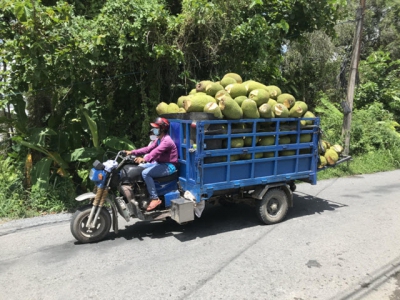Advantages of Thai jackfruit trees in Mekong Delta

High demand in the market, easy to grow and more important, fruits can be harvested all year round to avoid surplus in the market
Traders buy jackfruits in the Mekong Delta. Photo: Minh Dam.
In recent days, the increase inThai jackfruit prices have been good news in the fruit market in the Mekong Delta amid social distancing during the Covid-19 pandemic. The price reached a peak of VND52,000 per kilogram two weeks ago.
The farm-gate price of first-class Thai jackfruits is now VND30,000 per kilogram while the price of second-class fruits is VND20,000 per kilogram and the third-class fruits are sold at VND10,000 per kilogram.
According traders and wholesalers, the reason for the increase of Thai jackfruit prices in recent days is high demand in the Chinese market. In addition, the main harvest of many types of fruit is over at this time, so the supply of fruits is not abundant. Meanwhile, because many jackfruit processing plants well-implement "thee-on-spot", they need raw materials for operations.
In recent years, along with durian, dragon fruit, Thai jackfruit is a crop that brings a stable income to farmers because by growing jackfruit trees, farmers are able to harvest fruits all year round and no longer worried about oversupply.
Currently, the cultivation area of jackfruit trees, especially Thai jackfruit is expanding rapidly in the Mekong Delta. According to the Department of Crop Production, by 2020 there were above 30,000 hectares of jackfruit cultivation in the Mekong Delta, mainly concentrating in the provinces of Tien Giang and Hau Giang. Especially, Tien Giang has seen the sharp increase in the jackfruit growing areas. There are now 15,000 hectares of jackfruit trees in Tien Giang of which around 11,000 hectares are producing fruits.
In the Mekong Delta, many farming households chose jackfruit trees to grow on the area converted from ineffective rice fields and orchards because jackfruit trees are easy to grow and don't require much care.
However, according to the Department of Crop Production, many converted orchards are unqualified. Some orchards were not planted with qualified seeds and suitable techniques such growing trees at high density to make use of land, using too much fertilizers to maximize yield, abusing pesticides to kill pests and diseases.
In the summer-autumn crop of 2021, the rice planting area converted in the southern provinces was estimated at 27,394 hectares. Especially, the converted area in the Mekong Delta provinces was 23,816 hectares of which 6,420 hectares were converted into orchards, 20,620 hectares were converted into annual crops and the rest was used for aquaculture.
For jackfruit trees, farmer often grew at super high density of around 2.5 meter per tree, resulting in competition for nutrients and light. Therefore, many jackfruits had low quality and low prices. Above all, due to being early exploited most of jackfruit trees are in caducity and less sustainable.
Nguyen Minh Tan, a fruit wholesaler in Cai Lay town (Tien Giang province) said that if the orchards have high density, trees can't receive enough nutrients to grow and develop; consequently the fruits are small with big seed and thin flesh and taste is not good.
The issue that causes concern is that when a low quality product is put up for sale in the market, especially in the export markets, consumer will have bad impression on the product and then they develop a prejudice against that product. In addition, the Department of Crop Production also noted that organizing production and converting crops have not yet complied with planning and orientations of localities.
Therefore, it's necessary to enhance the link between production and purchasing to ensure the market for the products. The conversion of rice land into orchards requires huge capital investment; hence localities need to soon complete planning solutions and make plans on the conversion in association with the season, converted zones and consumption.
Có thể bạn quan tâm
 Code for growing area and packing facility helps fruits and vegetables reaching further
Code for growing area and packing facility helps fruits and vegetables reaching further Expanding the issuance of code for growing area and packing facility in recent years help Vietnam’s fruits and vegetables holding many important markets
 Mangoes, guava and mangosteen imported from Vietnam into the EU grow sharply
Mangoes, guava and mangosteen imported from Vietnam into the EU grow sharply Vietnam is the 31st biggest supplier of mangoes, guava and mangosteen for the EU, with the proportion is just 0.4% of the gross imported amount of the EU.
 China sharply reduced imports of Vietnamese cassava, increased imports from Thailand
China sharply reduced imports of Vietnamese cassava, increased imports from Thailand In recent months, China has cut imports of cassava from Vietnam, while increasing imports from Thailand and Indonesia.